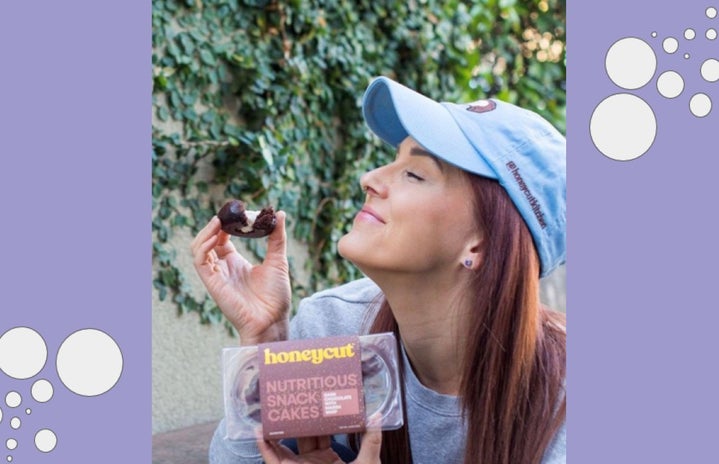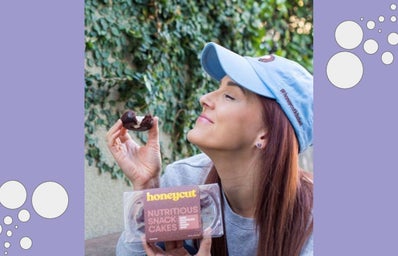A Columbia, Missouri native, Jenny Heman grew up with a love for a Midwestern favorite: the snack cake. As she began to pursue fitness—bodybuilding, in particular—nutrition became an important component of her life. A psychology and math double major in Northwestern’s Class of 2013, Heman went on to build her own company, Honeycut Kitchen, that produces nutritious snack cakes. Honeycut’s mission is to allow people to consume their favorite childhood snack with modern, health-conscious alterations. Honeycut uses wholesome, natural ingredients, so a consumer does not need to sacrifice their health goals for a treat. I had the opportunity to chat with Heman over the phone about her experience at Northwestern and the path that led to the founding of Honeycut Kitchen. (Read my review of the snack cakes here.)

How did you choose Northwestern?
It’s a dorky story. I made a spreadsheet of all the colleges I was accepted into, and I had variables for each of them. Even weather was a variable, number of students, degrees I could pursue. I had a lot of things to debate about. The year I graduated high school (2009), it was a time of a lot of economic change. People were really concerned about what they should be doing.
What extracurriculars were you involved in at NU?
I worked every year I was in school, although I did do cheer for two years. I’ve always been a worker; all through high school and college I worked.
What was your favorite part of being in college?
I think the best part of Northwestern was the challenge. As you guys are in the thick of it, you probably don’t agree with this. The challenge of the coursework and the type of students you get at Northwestern, what you’re surrounding yourself with, it’s really great. It was unique in that it was always very challenging mentally to go down the thought processes being pushed in classes. You’re meeting a diverse set of hyper-intelligent friends and students in your classes that are also always challenging you. As I look back at my life and at high school, I think that my Northwestern years really stand out.
How did you choose the name “Honeycut”?
The name actually comes from an inside joke between my sisters and me. Our last name is Heman, and we were sort of teased for it. There’s an early ’90s cartoon that uses the name, and my older sister used to joke that we should change our name to Honeycut, also from the cartoon.
Have you always wanted to be an entrepreneur?
I’ve known I have wanted to own my own business for quite a while. I didn’t know what form it would take, that took time. I always wanted it since I was, probably, in middle school. Ever since I moved on from drawing pictures of my career goals in kindergarten, I knew I wanted to own my own business. I knew that going into Northwestern.
How did Northwestern help you prepare for being a CEO?
I knew I wanted to go into business, so when I was looking at schools, that was a main variable for me. I wanted to go to a school that had an undergraduate business program, which Northwestern doesn’t have. I had this blanket statement I’d use, “Hey, anyone can go and get an MBA, no one needs two business degrees.” Northwestern was about pushing my mental boundaries, pushing my strength and endurance. I was taking all these crazy classes. I’d probably be surprised if I looked back at my course list now. The name itself is very helpful, that’s just how the world works. It’s well-recognized. When I left, the name helped me set up on the path I’m on right now.
What are some challenges you’ve faced since deciding you wanted to pursue owning your own business?
There’s a lot. I’ve always been a super academic person, I just study, study, study, doing what is asked of me, but there’s always been a general framework of what needs to be done. When you go to start your own business, it’s up to you to figure out what needs to be done. There’s no book to read, it’s not taught in school. I had to spend a lot of time thinking about what I want my days to look like, how hard I want to push myself, how I want to lead people, what are our values. I was faced with the reality of the challenge of getting things done without that structure. It’s also challenging to do it in isolation. When I started, I had no connections and I was looking for someone to fill a co-founder type role. It’s hard to do it alone because you’re constantly faced with decisions, and even if I’ve taught myself how to make them more confidently and quicker, which I have, there’s still this gap. It would be really nice to do it with another person who could tap me on the shoulder and tell me if I’m doing the right thing or if I should be doing something different.
How were the recipes developed? Did you do it on your own?
Yeah, I did. If I’d had more experience at that point, I would have worked with a food scientist from day one. But no, I actually moved into my sister’s basement in St. Louis, and I used her kitchen for five months. I just baked all day. I had all these things to do, and I’m an academic learner, so two years down the line, I’m like, “Screw it, I’m going to buy a textbook on the chemistry of baking.” I was watching YouTube videos and observing their recipes. A lot of the time I was making other peoples’ recipes and then changing and swapping ingredients. I learned the super hard way that that’s the wrong thing to do. I even considered going to a high-intensity baking/pastry program. I taught myself along the way.
What are your plans for the future?
My long-term vision is to really enter the snack cake category, which is like, Little Debbie. That’s a lot, because those are available at pretty much every retail point: Sam’s Club, Walmart, the Dollar Store, gas stations. My goal is to get there. I’m currently focusing on Southern California, where the market is more in tune with health and wellness. I’m trying to figure out exactly how we get to mass scale the quickest. I’m working with some fitness outlets and natural retailers.
Do you have any advice for young entrepreneurs?
I don’t want to say that I’m good at it yet! If there’s something I could’ve done differently, it would’ve been to go harder, faster. There’s a lot of ways to get to your end goal. I have a lot of admiration for young entrepreneurs because even though I had known I was going to start a business, I always said, “Well, let me learn some stuff first. Let me get a college degree. Let me build up a resume so people respect me.” The truth is, none of that stuff is necessary to be a good entrepreneur. So, I have a lot of admiration for people who start at a younger age and battle through stuff that they have to do as soon as they can. I definitely don’t feel like I’m a hero yet, or like I can look back and be giving advice. I hope to be one one day, but I’m not there yet.


